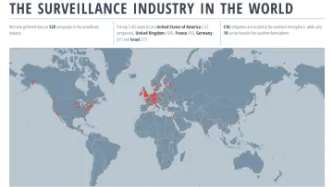
…it protects our right to education
Everyone has the right to a safe, open, and inclusive education, free from commercial exploitation, that enables their full and free development and promotes human flourishing regardless of race, religion or country of origin.

Students around the world are quickly turning into training-data for intrusive facial recognition technology. In Sweden, the national Data Protection Authority (DPA) ruled that students at Anderstorp High School in Skellefteå had their right to privacy violated by the testing of facial recognition software to take attendance.
The Skellefteå school board invited a private company, Tieto, to install facial recognition cameras across classrooms that would automatically register students’ class attendance. The company claimed they were saving educators 10 minutes per lesson compared to traditional methods of taking attendance.
Neither students nor their parents can freely give their consent to their data being collected when they are in a dependent relationship with their school. This was confirmed by the Swedish DPA.
Tieto claimed they had investigated students’ opinions toward the technology, before testing, students had viewed the technology as, “scary and controlling.” But this wasn’t enough to stop them.
They claimed that after testing the technology “‘scary’ was replaced by futuristic and fun”. Children think lots of things are fun – ‘fun’ isn’t an adequate reason to undermine children’s fundamental human rights. But the school board and technology company failed to complete a sufficient data privacy impact assessment before launching the trial – maybe they thought that consulting children would be an adequate replacement. For violating GDPR, the company was fined 20,000 Euro.
Sweden isn’t the only country to attempt to integrate facial recognition into classrooms; similar cases have been considered by the French DPA, and in some New York schools, facial recognition cameras are being used to police entrances and hallways in schools. Even in China, where facial recognition cameras are already being used to detect students’ mood and level of focus based on pseudoscientific analysis of their facial expressions, the government thinks things have gone too far – and are now looking to curb the use in schools.
Students exercising their right to education should not be subject to mandatory monitoring for which they cannot freely give consent. The Covid 19 pandemic and the transition to online education has only accelerated the integration of automated and data-driven technology into classrooms.
It is essential that data regulators, policymakers, technology providers, and educators consider students’ right to privacy when promoting the use of new technologies, keeping our classrooms free from commercial exploitation.
1. Everyone has the right to education. Education shall be free, at least in the elementary and fundamental stages. Elementary education shall be compulsory. Technical and professional education shall be made generally available and higher education shall be equally accessible to all on the basis of merit. 2. Education shall be directed to the full development of the human personality and to the strengthening of respect for human rights and fundamental freedoms. It shall promote understanding, tolerance and friendship among all nations, racial or religious groups, and shall further the activities of the United Nations for the maintenance of peace. 3. Parents have a prior right to choose the kind of education that shall be given to their children. Article 26, Right to education



